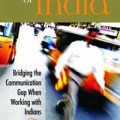
Why should I care about talking about cricket with my colleagues?
What difference does it make if I remember the names of my client’s kids or not?
Who cares if I know the important celebrities in India? Or all 29 states?
These are just nice add-ons that will make business go slightly smoother, right? Cute, but not necessary to make good business happen.
…said people who have never actually done business in India (or most of the rest of the world).
There is no way to overstate this. Either you understand that the quality of your relationships is the largest factor in your ability to do good business, or you will understand it later after you screw it up.
Building relationships in India is extremely important, and I like to refer to the ‘quality of your relationships’ as your Relationship Capital. Although it seems sacrilegious to compare relationships to finances, it does help some of us.
You should consider it capital for a few reasons.
It takes a long time to build. This is not just a friendly exchange at a trade show and all of a sudden you are best friends. This is months (sometimes years) of staying in touch, asking about family, and other actions that prove you are going to be around for the long haul.
…unless you inherit it. Some people are born with the right connections and are groomed to know how to use them.
The only way to get a lot more is to spend what you have. Only after you cash in the capital you’ve earned to call in a favor will you be rewarded with an even greater amount of capital than you had to begin with. Without risk, there is no return.
It should be diversified. One business contact in India is not the key to international success. You need to think in terms of a network of people you have significant investments with.
It is accepted everywhere. If I am close friends with the owner of a major Indian manufacturing company in Chennai, that is considered legal tender throughout India (sometimes very literally).
Your success in India is based on your ability to build and leverage the Relational Capital you have. It’s true that Relational Capital is not essential to doing business in India. But that kind of business is often cheap, commoditized, frustrating, shady, and may make you swear to never do business with someone outside your state/province. If you want to do well in India, high Relational Capital is the way to go.
If you are still unconvinced, here are three simple, but undeniable reasons why having good Relational Capital is absolutely necessary.
1. You are only as valuable as the network you represent
Similar to the idea of #See1See100, when an Indian exchanges visiting cards with you, they are not just interested in doing business or staying connected with you. They are interested in doing business with you and everyone in your circle of influence.
Greg launches a tech startup in India with an Indian partner who has just left a high-profile post at TCS. Greg used to be a General Manager at Hilton Hotels. They have three IIT professors on their board of directors, along with the Managing Editor of the biggest English daily newspaper in the city. They already have clients in the Tata, Reliance, and Aditya Birla groups. Greg has very little problem getting the attention he needs.
Sharon worked with a small NGO in India for few years, but has now teamed up with one of her former colleagues to launch a startup in the same space (and with a superior product in every way). However, they are going to have a nearly impossible time finding any traction without someone with a big name backing them.
While this dichotomy could take place anywhere in the world, in India people will put more weight on who you know rather than what you do. They know that doing business with you might be a stepping stone to something even greater down the line.
2. People will do business with someone in their circle, but not someone outside it
Yes, you will find people who want to make a quick deal and don’t care who you are, but that is not the kind of business you want to do. When a serious Indian businessman is considering getting into an agreement with someone, he wants to make sure that he not only knows the other person very well, but that there is some mutual obligation to each other in case things get rocky. Doing business with a stranger with nothing to lose is a bad deal for Indians.
3. You will run into roadblocks that you can’t overcome on your own.
Nothing is ever smooth in India. You will one day get a knock on your door with a legal notice forcing you to close operations. You will get a call from a particular government approval officer who doesn’t like the color of your letterhead. You will have containers sitting in customs for months at a time.
Who are you going to call? The government helpline? Send an email to queries@customs.gov.in? Didn’t think so. You are going to start spending some capital.
We are going to stay on this topic of building relationships in India for the next two articles. First, we’ll look at a few of the best ways to build relational capital, and then a few ways to ruin it.
Subscribe now to make sure you get all the articles in your inbox!
Image Credit: David Brossard on Flickr





Just got back from a week in UP where several of Neil’s tips proved helpful,
especially deference to power holders, taking time to drink very-pleasant tea,
queries about family, no comparisons with my home country, enjoying all
the food dishes, gratitude for kindness… Not very profound, but pleasant.
Glad it is working well for you! Stringing together a lot of very pleasant encounters is a smart path.